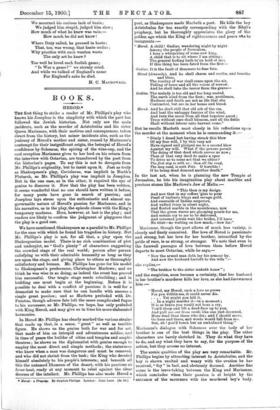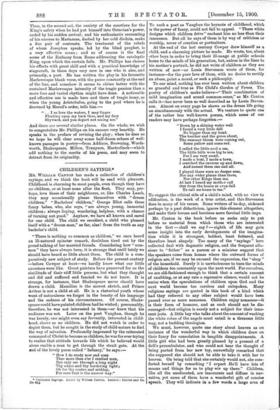BOOKS.
HEROD.*
THE first thing to strike a reader of Mr. Phillips's play who knows his Josephus is the simplicity with which the poet has followed the Jewish historian. Not only are the main incidents, such as the murder of Aristobulus and his sister Queen Mariamne, with their motives and consequences, taken direct from the history, but minor incidents also, such as the jealousy of Herod's mother and sister, roused by Mariamne's contempt for their insignificant origin, the betrayal of Herod's confidence by Sohemus, the spicing of the wine-cup, and the cool reception Mariamne gives to her lord on his return from the interview with Octavian, are transferred by the poet from the historian's pages. To say this is not to derogate from Mr. Phillips's originality, but to insist upon it. Just as truly as Shakespeare's play, Coriolanus, was implicit in North's Plutarch, so Mr. Phillips's play was implicit in Josephus. But in the one case, as in the other, it required the eye of genius to discover it. Now that the play has been written, it seems wonderful that no one should have written it before, for many poets have gone in search of passion; and Josephus lays stress upon the enthusiastic and almost un- governable nature of Herod's passion for Mariamne, and in his narrative, as in the play, the episode closes with the King's temporary madness. Here, however, at last is the play ; and readers are likely to confirm the judgment of playgoers that the play is a good one.
We have mentioned Shakespeare as a parallel to Mr. Phillip s for the ease with which he found his tragedies in history. But Mr. Phillips's play is not, for all that, a play upon the Shakespearian model. There is no rich combination of plot and underplot, no " God's plenty " of characters suggesting the crowded stage of the real world; person after person satisfying us with their admirable humanity as long as they are upon the stage, and giving place to others as thoroughly satisfactory and human. Mr. Phillips has gone for his model to Shakespeare's predecessor, Christopher Marlowe ; and we think he was wise in so doing, as indeed the event has proved him successful. Our tragic stage needs rebuilding ; and in building one must begin at the beginning. Before it is possible to deal with a conflict of passions it is well for a dramatist to make sure that he can handle with success a single great passion; and as Marlowe preluded with Dr. Faustus, though adverse fate left the more complicated fugue to his successor, so Mr. Phillips, we hope, has only preluded with King Herod, and may give us in time his more elaborated harmonies.
In Herod Mr. Phillips has clearly marked the various strains that made up that, in a sense, " great " as well as terrible figure. He shows us the genius both for war and for art. that made of him an intrepid and adventurous soldier, and in time of peace the builder of cities and temples and amphi- theatres; he shows us the diplomatist with genius enough to employ the most direct and simple methods ; the statesman who knew when a man was dangerous and must be removed, and who did not shrink from the task; the King who devoted himself absolutely to his people's interests ; and beneath all this the untamed Idumean of the desert, with his passions at fever-heat, ready at any moment to rebel against the clear decrees of the intellect. Mr. Phillips has also made Herod a • Herod : a Tragedy. By Stephen Phillip. London : John Lane. [46. sd.l
poet, as Shakespeare made Macbeth a poet. He kills the boy Aristobulus for too exactly corresponding with the Sibyl's prophecy, but he thoroughly appreciates the glory of the golden age which the King of righteousness and peace ate to inaugurate :-
" Herod. A child! (ladies, wandering night by night Among the people of Jerusalem,
1 hear a whispering of some new king, A child that is to sit where I am sitting ; The general boding hath ta'en hold of me; If this thing has been fated from the first—.
Gadias. It is the fault of dreamers to fear fate.
Herod (dreamily). And he shall charm and soothe, and breathe
and bless, The roaring of war shall cease upon the air, Falling of tears and all the voices of sorrow.
And he shall take the terror from the grave- Gadias. The malady is too old and too long rooted. The earth ailed from the first ; war, pestilence, Madness and death are not as ills that she Contracted, but are in her bones and blood.
Herod. And he shall still that old sob of the sea, And heal the unhappy fancies of the wind, And turn the moon from all that hopeless quest ; Trees without care shall blossom, and all the fields Shall without labour unto harvest come."
But he recalls Macbeth most closely in his reflections upuu the murder at the moment when he is commanding it :- "Dimly I dread lest having struck this blow Of my free will, I by this very act Have signed and pledged me to a second blow Against my will. What if the powers permit The doing of that deed which serves us now ; Then of that very deed do make a spur To drive us to some act that we abhor? The first step is with us ; then all the road, The long road, is with Fate. 0 horrible ! If he being dead demand another death."
In the last act, when he is planning the new Temple at Jerusalem, he lets his imagination play about marbles and precious stones like Marlowe's Jew of Malta :—
" This then is my design.
And now that in my coffers 'gins to pour Pearl of barbaric kings and savage gold, And emeralds of Indian emperors, And wafted ivory in silent night, And floated marble in the moonbeams, now That the green waves are glooming pearls for me, And metals cry to me to be delivered, And screened jewels wait like brides, I'll have No stint—no waiting on how much,—how far."
Mariamne, though the part allows of much less variety, is clearly and finely conceived. Her love of Herod is passionate and strong, but her love for her brother, intensified by the pride of race, is as strong, or stronger. We note that even in the farewell passages of love between them before Herod
departs to meet Octavian, while he says,-
" Now the armed man doth lay his armour by, And now the husband hasteth to the wife "-
she replies,- " The brother to the sister maketh home";
and the suspicion, soon become a certainty, that her husband is her brother's murderer kills her love, as she had forewarned ham:-
"Herod, my Herod, such a love as grows
For you within me, it could never die.
. . . Yet might you kill it, . . In a night murder it—in a moment ; It is so brave you would not hear a cry, You'd stoop and lift a dead face up to you, And pull me out from reeds like one just drowned, More dead than those who die; and I should move,
Go here and there, and words would fall from Inc.
But, ah ! you'd touch but an embalmed thing."
Mariamne's dialogue with Sohemus over the body of her brother is one of the beat things in the play. The other characters are barely sketched in. They do what they have
to do, and say what they have to say, for the purpose of the action, but they arouse no interest.
The scenic qualities of the play are very remarkable. Mr. Phillips begins by attracting interest to Aristobulus, and the boy is shown excited and weary with the ovation he has received, " fey " in fact, and obviously doomed. Another fine scene is the leave-taking between the King and Mariamne, which concludes when their passion is at height by the entrance of the mourners with the murdered boy's body. Then, in the second act, the anxiety of the courtiers for the King's safety when he had put himself into Octavian's power, ended by his sudden arrival; and his enthusiastic recounting of his success to Mariamne, dashed by her cold disdain, make a fine pair of contrasts. The treatment of the rebels of whom Josephus speaks, led by the blind prophet, is a very effective scene ; and so of course is the final scene of the Embassy from Rome addressing the cataleptic King, upon which the curtain falls. Mr. Phillips has chosen his effects with great skill and with a practical knowledge of stagecraft, in these days very rare in one who is also, and primarily, a poet. He has written the play in his favourite Marlowesque blank verse, with the pause constantly at the end of the line, and somehow it seems to chime better with the sustained Marlowesque intensity of the tragic passion than a more free and varied rhythm might have done. A noticeable and effective use is made here and there of tragic irony, as when the young Aristobulus, going to the pool where he is drowned by Herod's order, tells him :-
" . . I so love the waters, I may linger Floating upon my back thus, and my face Skyward, and you depart not seeing me."
And there are several similar places. On the whole, we wish to congratulate Mr. Phillips on his success very heartily. He speaks in the preface of revising the play ; when he does so we hope he will clear away some half-dozen echoes of well- known passages in poetry—from Addison, Browning, Words- worth, Shakespeare, Milton, Tennyson, Maeterlinck—which add nothing to the merits of his poem, and may seem to detract from its originality.















































 Previous page
Previous page